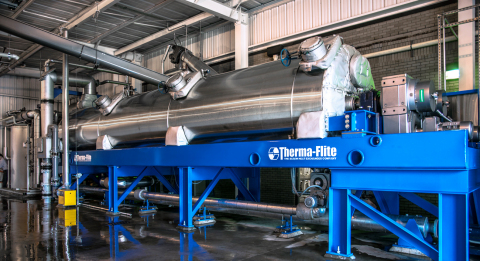
Waste Water Treatment Plant Sees Economic and Environmental Return on Investment with Biosolids Drying System from Therma-Flite
June 8, 2015 | By Business Wire News
DALLAS
Today, Therma-Flite, a resource recovery technology company, released a new case study that provides municipalities with a look at how one mid-sized city has achieved its goals of eliminating transportation and landfill costs associated with biosolid waste disposal. Regulatory, economic and environmental pressures prompted the plant operations leader to seek equipment and systems that could transform biosolids into Class A product. Now three years down the road from the start-up of a biosolids thermal dryer manufactured by Therma-Flite, the city has realized a number of goals established at the onset of the project.
This Smart News Release features multimedia. View the full release here: http://www.businesswire.com/news/home/20150608005999/en/

Rogers Arkansas has used the Therma-Flite BIO-SCRU(R) biosolids dryer to eliminate transportation and landfill costs and is able to contract with a company who pays them to haul it away for land applications. (Photo: Business Wire)
“There are certain conditions that make the BIO-SCRU® a good fit for municipalities and in this case, the system fit our requirements perfectly,” said the plant operations manager. “First we identified a need for a continuous feed system matching to the dewatering technology. We wanted to avoid a batch system which can get into some odor issues and that was important for us to avoid in our community.” The continuous feed system is designed with software that allows Therma-Flite technicians to program the right timing and temperature variables during start up testing. Once programmed it can run 24/7 and requires less plant operations staff to run the system.
“The ability to produce Class A product from our biosolids was a key requirement because that would, in turn, solve several issues for us,” said the plant operations manager. “We were looking at ways to reduce the escalating transportation costs involved in hauling the biosolids for disposal and the costs and risk associated with putting Class B or other solids in the landfill. With the Therma-Flite dryer, we were able to actually eliminate trucking and disposal costs altogether—which can run a plant the size of ours more than $400,000. One of the biggest headaches prior to installing the drying system was figuring out what to do with the increasing amounts of waste biosolids and now, we are finding with Class A product, that we’ve a company who pays us by the ton to haul it away.”
“With Class A product, its safe for reuse and when the contractor comes to take it away, we no longer have the responsibility like we had with Class B waste—that’s worth a lot to us—you can’t put a price tag on that.”
Another factor that led to the selection of the biosolids drying system was the need for a system that had a relatively small footprint, which would be more cost-effective for the plant to run and it would also fit inside a smaller building.
The key criteria that the municipality set forth for the project—and ultimately the value it returned included:
1.) Ability to produce Class A biosolids
2.) Eliminating the cost of transporting high volumes of wet sludge to landfills
3.) Avoiding the landfill costs for Class B biosolids
4.) Being as environmentally conscious as possible for the surrounding community
5.) Reducing the risk and record keeping associated with non-Class A sludge
“New regulations are driving both risk and costs upward and the need for technology that helps municipalities recover environmentally safe resources that can be sold or given away is growing,” said Therma-Flite CEO Mike Potter. “This is a part of our mission and many of our customers have been able to achieve their goals. For this particular customer, they’ve gone from paying nearly a half a million dollars to dispose of the waste to selling the Class A output product to a contractor who markets the product and hauls it away.”
Typical applications for the Class A product include soil amendment used by sod farms to grow turf to landscaping companies who need high volumes of fertilized soil for commercial and residential clients to golf courses and parks who need high-nutrient rich soil to maintain visually appealing grounds to livestock farmers who utilize the soil amendment for hayfields that feed their cattle and horse herds.
Project Stats:
Design Flows- 14.7 max 7.5 avg
Process Flows- 35 dry tons/week 150 dry tons/month
Operation Hours- 14 hours/day 5 days/week
Sludge Type- WAS
Solids Retention Time- 19-21 days
Dewatered Solids- 19-20% d.s.
Final Dried Product- 94% d.s.
Beneficial Reuse: Contracts with a company who markets Class A product
Dryer Started- July 2013
Fuel Source- Natural Gas
Bio-Scru Model- IC 7,000
Heating Fluid- Thermal Oil
Condenser- Direct Contact
After a thorough review of various technology options, the Arkansas city made a decision to go with the Therma-Flite IC Series BIO-SCRU® dryer in May of 2011. “We looked at solar dryers, we looked at microwave dryers, and we looked at batch dryers from a list of leading manufacturers,” recalls the plant operations manager. “We saw some interesting systems but we needed a system that fit our unique criteria.”
About Therma-Flite:
Therma-Flite is a resource recovery company that builds innovative thermal processing systems that extract resources that would otherwise go to a landfill or to waste. With operations in several locations throughout the US, the company helps customers in NA as well as Europe and Asia, maximize the value of their waste streams in an environmentally responsible manner. For more information, visit www.therma-flite.com.
View source version on businesswire.com: http://www.businesswire.com/news/home/20150608005999/en/
Therma-Flite
Marilyn Franklin, 214-957-8816
mfranklin@therma-flite.com
